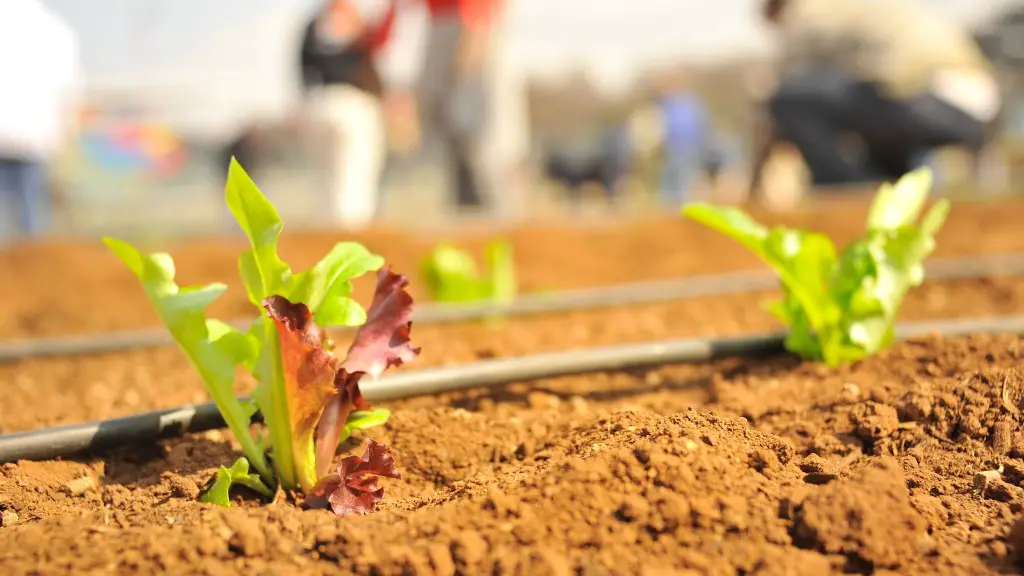One might not immediately think of a connection between medicine and agriculture, but they are in fact quite intertwined. Agriculture is the main source of food for human beings, and what we eat has a direct impact on our health. The quality of the soil in which crops are grown, the use of pesticides and other chemicals, and the presence of water all play a role in determining the safety of our food supply.
In addition, the health of animals raised for food is also important. The overuse of antibiotics in livestock can lead to the development of antibiotic-resistant bacteria, which can then be transmitted to humans. Poor sanitation and living conditions on factory farms can also lead to the spread of disease.
Thus, protecting the health of the environment and the animals that live in it is essential for safeguarding our own health. Agricultural practices that take into account the ecological needs of the planet are not only good for the planet, but good for our own health as well.
There is a close relationship between medicine and ecology and agriculture. Ecology is the study of the environment and its effects on living things. Agriculture is the production of food, fibre and other goods through the cultivation of plants and animals. Medicine is the science and art of diagnosing, treating and preventing disease.
Agricultural medicine is a field of medicine that focuses on the health problems of agricultural populations. This includes the anticipation, recognition, diagnosis, treatment, prevention, and community health aspects of health problems peculiar to agricultural populations. Agricultural medicine practitioners work to improve the health of farmers and other agricultural workers, and to prevent and control the spread of diseases that are common in agricultural settings.
Ecosystems are complex systems that include all the living organisms in a given area as well as the non-living components of the environment. These systems are self-sustaining and function as a unit.
Ecosystems are dynamic, always changing in response to the environment. They are also resilient, meaning they have the ability to recover from disturbance.
The strengths of natural ecosystems include their ability to:
– cycling of nutrients
– purification of water
– regulation of climate
– provide habitat and support for wildlife
– resist and recover from disturbance
To develop these strengths in the context of farm fields and farms, we need to:
– create buffer zones around farm fields
– use cover crops and crop rotations
– restore and protect natural habitats
– reduce chemical inputs
– promote sustainable farming practices
How does ecology relate to medicine
Ecological medicine is a relatively new field that is gaining popularity as we become more aware of the impact of our actions on the environment. It addresses the interactions between the individual and the environment and their health consequences. This includes the impact of environmental factors on the individual, as well as the impact of each individual’s actions on the environment. Ecological medicine is important because it helps us to understand how our actions can impact our health and the health of the environment.
Ecosystem processes can play an important role in supporting agricultural systems. Services such as pollination, pest control, genetic diversity, soil retention, and regulation of soil fertility, nutrient cycling and water can all be provided by ecosystem processes. By understanding and managing these processes, we can help to ensure that agricultural systems are more productive and sustainable.
How does agriculture affect healthcare?
Farmers are exposed to a variety of health hazards on a daily basis. These hazards can take a toll on their health, leading to an increased prevalence of many acute and chronic health conditions, including cardiovascular and respiratory disease, arthritis, skin cancer, hearing loss, and amputations.
Farmers need to be aware of the health hazards they face and take steps to protect themselves. Wearing proper protective gear, using safety equipment, and following safety protocols can help reduce the risks. Farmers should also be sure to stay up-to-date on their vaccinations and get regular check-ups to help catch any health problems early.
Small-scale urban agriculture can have a number of benefits for the environment. By localized food production, we can reduce the overall environmental footprint of our food system. This is because local production requires less transportation, and thus emits less greenhouse gases. Additionally, local production often requires less energy than large-scale production, further reducing the environmental impact of our food system.
There are also a number of other benefits to small-scale urban agriculture. For example, it can help to create green spaces in cities, and can provide fresh produce to city dwellers who might not otherwise have access to it. Additionally, urban agriculture can create jobs and economic opportunities in cities.
Overall, small-scale urban agriculture can be a great way to improve the sustainability of our food system. It is important, however, to remember that the success of urban agriculture depends on the specific context in which it is practiced. Therefore, it is important to consult with experts and community members to ensure that urban agriculture is a good fit for your community.
Why is ecology important in agriculture?
One of the many benefits of ecological agriculture is that it improves pollination. This is because ecological farmers work to create a more diverse and natural habitat for pollinators, like bees and butterflies. In turn, these pollinators help to improve crop yields by pollinating the plants.
Agroecology is the study of how agricultural systems interact with the natural environment. It is a relatively new field that combines elements of ecology, agriculture, and environmental science. Agroecologists work to develop more sustainable and environmentally friendly ways of producing food.
Why is it important to understand ecology in agriculture
Agricultural ecology is the study of how crops and livestock interact with their environment, including the soil, water, air, and other organisms. It can help us better understand the processes used to produce our food, and lead to better and more sustainable farming practices. For example, by studying the ecology of a particular crop, we can learn what kind of environment it needs to thrive, and how to best manage it to minimize pest problems and maximize yields.
Physicians have always recognized environment as of fundamental importance in all problems of medicine. They have unconsciously been ecologists, much like the man who, on taking up in his later years the study of grammar, was astounded to learn that he had always been using it.
How do ecosystems provide us with medicine?
Medicinal plants play an important role in many communities, providing both medicinal and cultural benefits. Unfortunately, these plants are often collected from wild populations, which can lead to dwindling numbers. To sustain these populations, some communities have turned to cultivation. This ensures a steady supply of plants for future generations and can help to preserve traditional knowledge.
The healthcare ecosystem is a term that is used to describe the community of patients and doctors, as well as all of the satellite figures involved in the medical care process or hospital stay. This term is used to emphasize the importance of the interdependence of all members of the healthcare community in providing optimal care for patients.
Is agriculture an ecological system
Agriculture, traditional refers to a simplified natural ecosystem that is exploited for the purpose of food and fiber production. The ecosystem is composed of a diversity of microbial, animal, and plant species that perform distinct ecological functions and services.
It is clear that health and agriculture are closely linked. Poor health can lead to reduced productivity in agricultural communities, which can in turn perpetuate a downward spiral into ill-health. Conversely, improved health can lead to increased demand for agricultural outputs. This underscores the importance of investing in health and agricultural programs that can improve the lives of people in agricultural communities.
What is the relationship between agriculture and public health?
Agricultural demand and output is one of the main factors influencing global health status. Poor health caused by poor sanitation, lack of access to health care and nutritious food, etc. reduces work performance, income and productivity in agricultural communities.
Multi-functionality of different strategies, degree of legitimacy and background study needs to be promoted in order to improve global health status in the agricultural sector.
Agricultural productivity and the health of farmers are intimately connected. Poor health can reduce productivity and lead to less effective agricultural development and deployment of appropriate agricultural knowledge, technology, and extension services (AKST). This, in turn, can exacerbate the burden of disease and poverty in rural communities. To address these issues, it is critical to integrate health concerns into agricultural policy and practice.
What are the five main environmental impacts of agriculture
Soil fertility loss, eutrophication of water bodies, deforestation, climate change and pesticide pollution are all environmental effects of agriculture. Soil fertility loss occurs when the nutrients in the soil are depleted, making it unable to support plants. Eutrophication of water bodies occurs when runoff from agriculture contains high levels of nutrients, leading to an increase in algae growth. Deforestation occurs when trees are cleared to make way for farmland. Climate change occurs when greenhouse gases are emitted from agricultural activities. Pesticide pollution occurs when pesticides used in agriculture contaminate the environment.
Agricultural pollution is one of the leading environmental problems in many countries. Pesticides, fertilizers and other toxic farm chemicals can poison fresh water, marine ecosystems, air and soil. They also can remain in the environment for generations. This issue needs to be addressed urgently to protect our environment and future generations.
Conclusion
Ecology is the study of how organisms interact with their environment. Agriculture is the practice of growing and managing crops. Medicine is the study and practice of diagnosing, treating, and preventing disease.
All three disciplines are closely related. Ecology and agriculture are closely linked, as the health of agricultural ecosystems depends on understanding and managing the complex interactions between plants, animals, and their environment. Medicine and agriculture are also closely related, as the health of both humans and animals depends on a safe and nutritious food supply.
Ecology and agriculture are interconnected in many ways. For example, the health of ecosystems can have a direct impact on the quality and quantity of crops. Likewise, the way we manage our agricultural lands can have a significant impact on the health of local ecosystems. As we continue to learn more about the relationships between ecology and agriculture, we can develop more sustainable and efficient methods for producing food while also protecting and conserving our natural resources.





